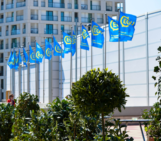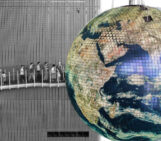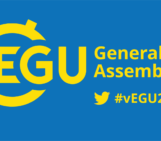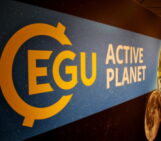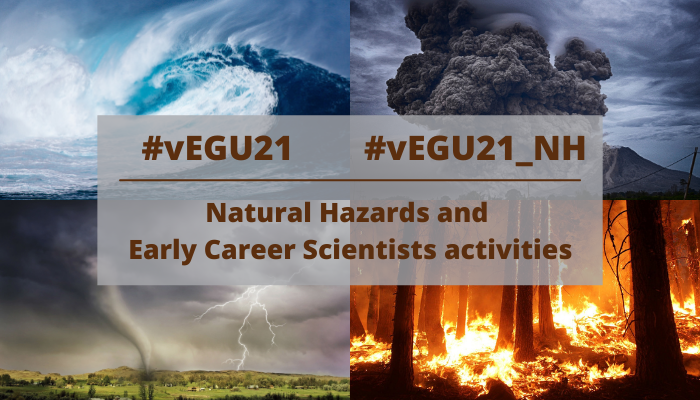
Have you heard the news? The next EGU’s General Assembly is starting on Monday, and this year it will last for two weeks!!! And yes, as you may have guessed, with the Covid-19 pandemic continuing to have a considerable impact on face-to-face scientific meetings throughout the world, EGU 2021 will be entirely virtual. And that’s not all. We will have the ability to interact with each other for two whole months. Isn’t this exciting?
There is still a little time to make plans for your program, and we are here to guide you through the Natural Hazard (NH) sessions and especially the ones targeted to the needs and interests of the Early Career Scientists (ECS). The Natural hazards Early career scientists Team (NhET) members are excited to participate in the event as attendees or contributors and as conveners of vPICO sessions and webinars.
Are you ready to engage, discover and inspire?
The first, most important Union-wide event is the Plenary meeting led by EGU President Alberto Montanari. It will take place on Mon, 19 Apr, 13:30-14:30 CEST; find the full event description here.
Union Symposia & Great Debates
This year’s meeting will feature five Union Symposia, which will last approximately two hours each, plus five Great Debates lasting one hour each. You can find more information on the Union Symposia here.
Check out and take part in the following Great Debates:
- Slow science vs fast science, Conveners: Andrea Madella, Michael Dietze, Annegret Larsen. Tue, 20 Apr, 09:00–10:30 (CEST)
Link to the full description here.
- Bullying in Academia: towards creating a healthy and safe working environment, Conveners: Anouk Beniest, Derya Gürer, Simone M. Pieber, Elenora van Rijsingen Thu, 22 Apr, 09:00–10:30 (CEST)
Link to the full description here.
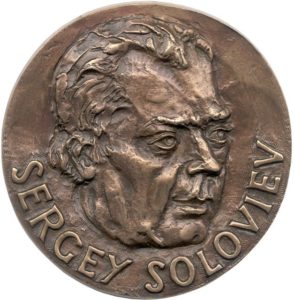
The Soloviev medal has been exclusively designed for the EGU by artist József Kótai.
Medal & Award Lectures
The honorary lectures of the NH Medal and Outstanding Early Career Scientist awardees have been scheduled as follows:
- NH 2021 Plinius Medal Lecture & 2020 Sergey Soloviev Medal Lecture & 2020 Division Outstanding ECS Award Lecture Wed, 21 Apr, 15:00–17:00 (CEST)
Link to the full description here.
- NH 2020 Plinius Medal Lecture & 2021 Sergey Soloviev Medal Lecture & 2021 NH Division Outstanding ECS Award Lecture Thu, 22 Apr, 10:30–12:30 (CEST)
Link to the full description here.
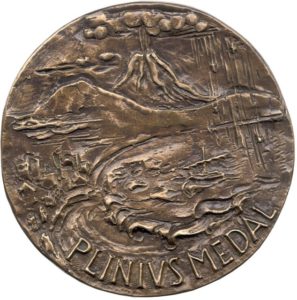
The medal has been exclusively designed for the EGU by the artist József Kótai.
Short courses
A selection of 56 sessions is offered this year in the form of webinars, below an editor selection of favourites.
- SC1.1 How to navigate the EGU: tips and tricks, Conveners: Anouk Beniest, Gregor Luetzenburg, Layla Márquez San Emeterio, Mon, 19 Apr, 09:00–10:00 (CEST)
- SC2.8 Promoting diversity in geosciences, Conveners: Olga Vindušková, Daniel Evans, Avni Malhotra, Layla Márquez San Emeterio, Erika Marín-Spiotta, Mon, 19 Apr, 10:00–11:00 (CEST)
- SC3.1 The scientific poster needs attention! Approaching the design process as a scientist, Conveners: Dorothee PostLinda Steiner, Tue, 20 Apr, 09:00–10:00 (CEST)
- SC3.2 Outreach: how to get your science out there? Conveners: Anita Di ChiaraMeriel J. Bittner, Valeria Cigala, Janneke de Laat, Shreya Arora, Thu, 22 Apr, 10:00–11:00 (CEST)
- SC5.18 Parametric delineation of geomorphological slope units with r.slopeunits in GRASS GIS, Conveners: Luigi Lombardo, Massimiliano Alvioli, Gabriele Amato, Ivan Marchesini, Mon, 26 Apr, 14:30–15:30 (CEST)
- SC4.14 An interdisciplinary approach to Forecasting and Early Warning Systems, Conveners: Adele Young, Erika Meléndez-Landaverde, Nikolaos Mastrantonas, Santiago Gómez-Dueñas, Linda Speight, Thu, 29 Apr, 10:00–11:00 (CEST)
You can find the complete list of short courses in the programme here.
Scientific sessions
This year, all scientific sessions will run in the new virtual PICO (vPICO) format, modelled after the popular interactive touchscreen presentations at the in-person EGU General Assembly. Each 1.5hour-long vPICO session will feature approximately 20 abstracts and be divided into two parts: an overview and chats. Overview sessions include an initial round of live 2-minute talks (each based on a single slide) presented in a central video chat moderated by the session conveners. After the live part, each presentation will have its own live text chat. Participants can post questions to the abstract authors to stimulate further discussion, just as PICO presenters assemble around touchscreens to continue their conversations. A central video chat will open for all attendees for further group discussion during the breakout text chats.
You can find more information about this year’s format here.
Starting from Monday, 26 April 2021, a selection of around 118 sessions focusing on natural hazards will become available.
The week starts with sessions addressing subjects varying from recent technologies and new perspectives in landslide monitoring and investigation, seismic hazard assessments and multi-risk disaster reduction, earthquake-induced hazards and technologies, and disaster risk modelling and management applications.
On Tuesday, the focus will be on landslide hazard, risk, forecasting and early warning systems, tsunamis, dynamics of snow avalanche and climate and hydrological extremes and hazards.
Wednesday‘s program offers a large variety of sessions with subjects covering hazard risk management, climate adaptation, climate extremes, multi-hazards, flash floods and rainfall-induced hydro-geomorphic hazards and flood modelling, volcanic hazards, remote sensing for anthropogenic and natural hazards.
On Thursday, the focus will be on monitoring and predicting natural hazards, forecasting and warning systems, remote sensing, natural hazard risk methods, effects of atmospheric electricity, thunderstorm and lightning, earthquakes, rockfalls, rockslides and rock avalanches.
The week will finish on Friday with sessions addressing the costs of natural hazards and vulnerability modelling of the built environment. Drought risk, wildfires, innovative sensing techniques, volcano hazard modelling, debris flows. But also, statistical and dynamical methods for geophysical extremes, assessment of seismic hazard and the impact of natural hazards on technological systems and infrastructure.
You can find the complete list of sessions in the programme here.
This year’s new unique characteristic is that 80 of the sessions mentioned above hold the Equality, Diversity, and Inclusion (EDI) logo demonstrating that they include conveners from multiple countries and institutes, different career stages, and more than one form of gender identity. You can read more on the EDI logo here.
The NhET members will be actively involved in the following session:
ESSI1.6 Spatio-temporal data science: advances in computational geosciences and innovative evaluation tools for weather and climate science, Co-organized by GI2/NP4, Mon, 26 Apr, 09:00–10:30 (CEST)
Conveners: Federico Amato, Jerome Servonnat, Daniela Castro-Camilo, Fabian Guignard, Christopher Kadow, Paul Kucera, Luigi Lombardo, Marj Tonini
Find the details on the vPICO presentations included in this session here.

Network. Image by Gordon Johnson from Pixabay
Networking
Networking is now more than ever essential to keep in touch with fellow scientists and share science, thoughts and brilliant ideas in a relaxed environment. As NhET, we have planned a Natural Hazard Division Early Career Scientists (ECS) Virtual Networking Event to interact with ECS. But don’t also miss the Division business meeting and the Division-wide networking event.
These events are open to everyone registered for the online conference.
- NET42 / EGU Pride, Convener: Anita Di Chiara, Mon, 19 Apr, 17:30–19:00 (CEST)
- NET17 / NH Division ECS Networking event, Convener: Valeria Cigala, Wed, 21 Apr, 12:30-13:30 (CEST)
- NET34 / NH Division wide Networking event, Convener: Ira Didenkulova, Fri, 23 Apr, 12:30-13:30 (CEST)
- DM14 / NH Division meeting, Convener: Ira Didenkulova, Fri, 23 Apr, 13:30-14:30 (CEST)
- NET23 / Union-wide ECS Networking event, Conveners: Simon Clark, Anouk Beniest, Anita Di Chiara, Tue, 27 Apr, 19:00–20:00 (CEST)
Last, but not for importance, there are several initiatives promoted by the Equality, Diversity and Inclusion (EDI) Committee that I’d like to point out to you. If you haven’t watched it yet, watch the Picture A Scientist documentary, check screen times here. Stop by the #ActualLivingScientist initiative, which will be featured on one of the screens in the EGU art room. And meet & greet with the EDI Working Group on Mon, 26 Apr, 17:00-17:30 (CEST).
We look forward to these interactive weeks of sharing science and bright ideas. I am sure you are too.
If you want to learn more about vEGU21: Gather Online, you can follow @EuroGeosciences or the Natural Hazards (NH) Division @NH_EGU on Twitter. The official conference hashtag is #vEGU21 and for our Division is #vEGU21_NH.
Post edited by Valeria Cigala and Gabriele Amato.

